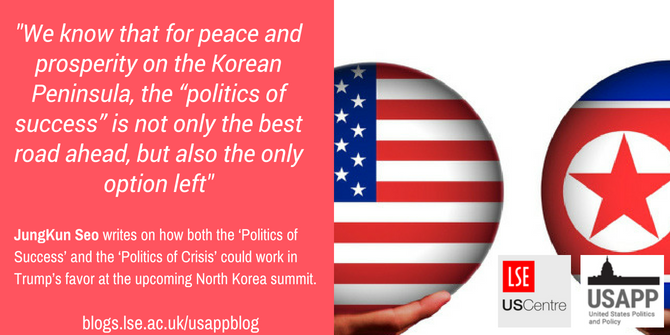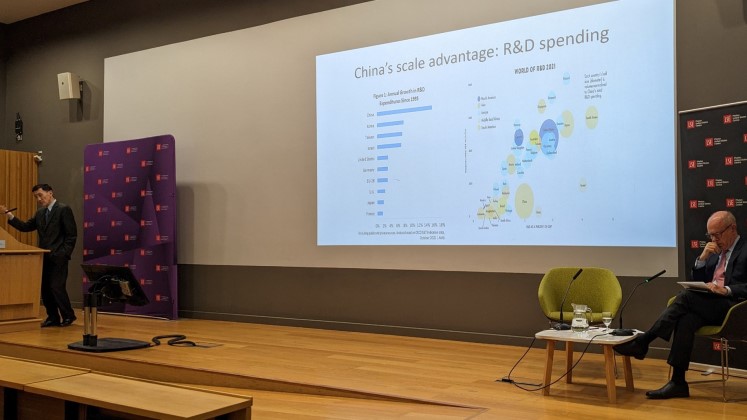 In June, US President Donald Trump and North Korea’s Leader, Kim Jong-Un will meet in Singapore for the first such high level talks since the end of the Korean War. Jungkun Seo writes that the negotiations could have one of two outcomes which Trump could spin to his advantage: ‘the politics of success’ or the ‘politics of crisis’. While one outcome would lead to greater tensions on the Korean Peninsula and the other might ease them, both could be used by Trump to improve his own standing at home and to increase the Republican Party’s chances of success in the upcoming midterm elections.
In June, US President Donald Trump and North Korea’s Leader, Kim Jong-Un will meet in Singapore for the first such high level talks since the end of the Korean War. Jungkun Seo writes that the negotiations could have one of two outcomes which Trump could spin to his advantage: ‘the politics of success’ or the ‘politics of crisis’. While one outcome would lead to greater tensions on the Korean Peninsula and the other might ease them, both could be used by Trump to improve his own standing at home and to increase the Republican Party’s chances of success in the upcoming midterm elections.
From the New Year’s Speech by North Korean leader Kim Jong-Un to the successful Winter Olympics in Pyeongchang to the historic summit meeting between South Korean President Moon Jae-in and Kim, we have watched a series of dramatic pictures and unexpected turns on the Korean Peninsula. Now the moment of truth is on the horizon and with fingers crossed, every Korean as well as the entire global community is waiting for the first-ever gathering between America’s sitting President and North Korea’s supreme leader in Singapore in June.
Evidently, things never seem to stop shifting. On the same day, President Trump announced his decision to withdraw from the Iran nuclear deal, Chairman Kim in Asia paid a second and surprising visit to China in two months for talks with Chinese President Xi Jinping. The hawks in the White House, including national security advisor John Bolton, appear to be tougher than expected on the negotiation agendas with regards to the notion of PVID (Permanent, Verifiable, and Irreversible Denuclearization). North Korean media have also changed their tone overnight, criticizing the US attempt to address human rights issues during the meeting.
What scenarios can we expect from the upcoming talks? Let me first talk about the “politics of crisis” situation. The simple and clear position of the United States is this: “you should give up everything before we give up anything.” In other words, Trump won’t move an inch until North Korea’s denuclearization is permanent, verifiable, and irreversible. Trump himself has long and loudly accused former presidents Clinton and Obama of getting played by North Korea’s “phased approach.” Because of Trump’s approach, Chairman Kim could not accept Trump’s proposal and Trump would simply walk away from the summit meeting. In that case, as many are worried about, the United States and North Korea could fall towards military confrontation. What is worth noting is that under this potential situation of “politics of crisis,” Trump would not lose much with the “rally-around-the-flag” effect swirling around in American domestic politics, and that this could even help his party in the midterm elections in November.

“usa-north-korea-conflict-trump-2893863” by geralt is licensed under CC0
What about the “politics of success” strategy? It is possible that if North Korea is so eager to exchange “no nukes” with “normal nation,” Kim Jong Un could make an agreement with Trump for a denuclearization announcement during the meeting and trust-building down the road. That is, Trump and Kim should declare their deal of North Korea denuclearization without necessarily pointing to any specific time table concerning the lifting of US sanctions, the opening of a liaison office in Pyongyang and the ratification of the peace accord between North Korea and the United States. Then, as long as North Korea is sincerely making progress on denuclearization, from facilities to technologies to materials, the two countries could build trust over the course of the Trump presidency at least until 2020. If the United States and the International Atomic Energy Agency (IAEA) could jointly certify that North Korea is complying, the American people should be increasingly flexible with the Trump administration’s “step-by-step” economic engagement with North Korea. Trump could push his party’s fortunes in the upcoming midterm elections via this “politics of success” by running on a record of diplomatic wins with North Korea as well as a growing economy and the recently passed tax cuts for millions of American families.
At this point, frankly speaking, I haven’t the slightest idea about whether Trump will enshrine the politics of success or exploit the politics of crisis. In fact, for his own political calculation prior to midterm elections, both could work in his favor. And yet, we know that for peace and prosperity on the Korean Peninsula, the “politics of success” is not only the best road ahead, but also the only option left. As Trump often says, “Let’s see what would happen.”
Please read our comments policy before commenting
Note: This article gives the views of the author, and not the position of USAPP– American Politics and Policy, nor of the London School of Economics.
Shortened URL for this post: http://bit.ly/2KoPWMy
About the author
 Jungkun Seo – Kyung Hee University
Jungkun Seo – Kyung Hee University
Jungkun Seo is an Associate Professor in the Department of Political Science at Kyung Hee University. Dr. Seo is teaching American Politics, US Foreign Policy, and Party Politics. Prior to Kyung Hee University, he also taught at the University of North Carolina at Wilmington (2007– 2012). Professor Seo’s research interests include American politics of foreign policymaking and US policy toward East Asia.






